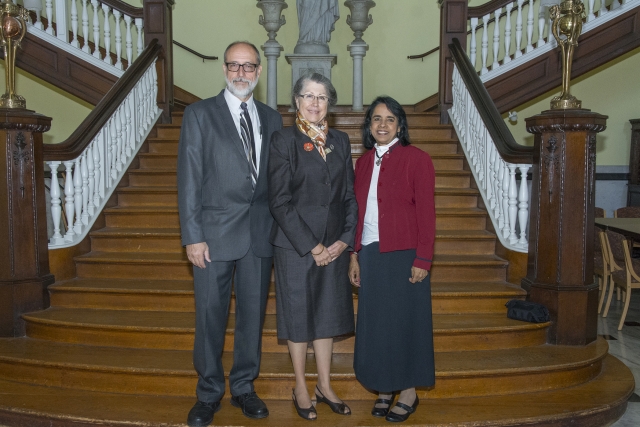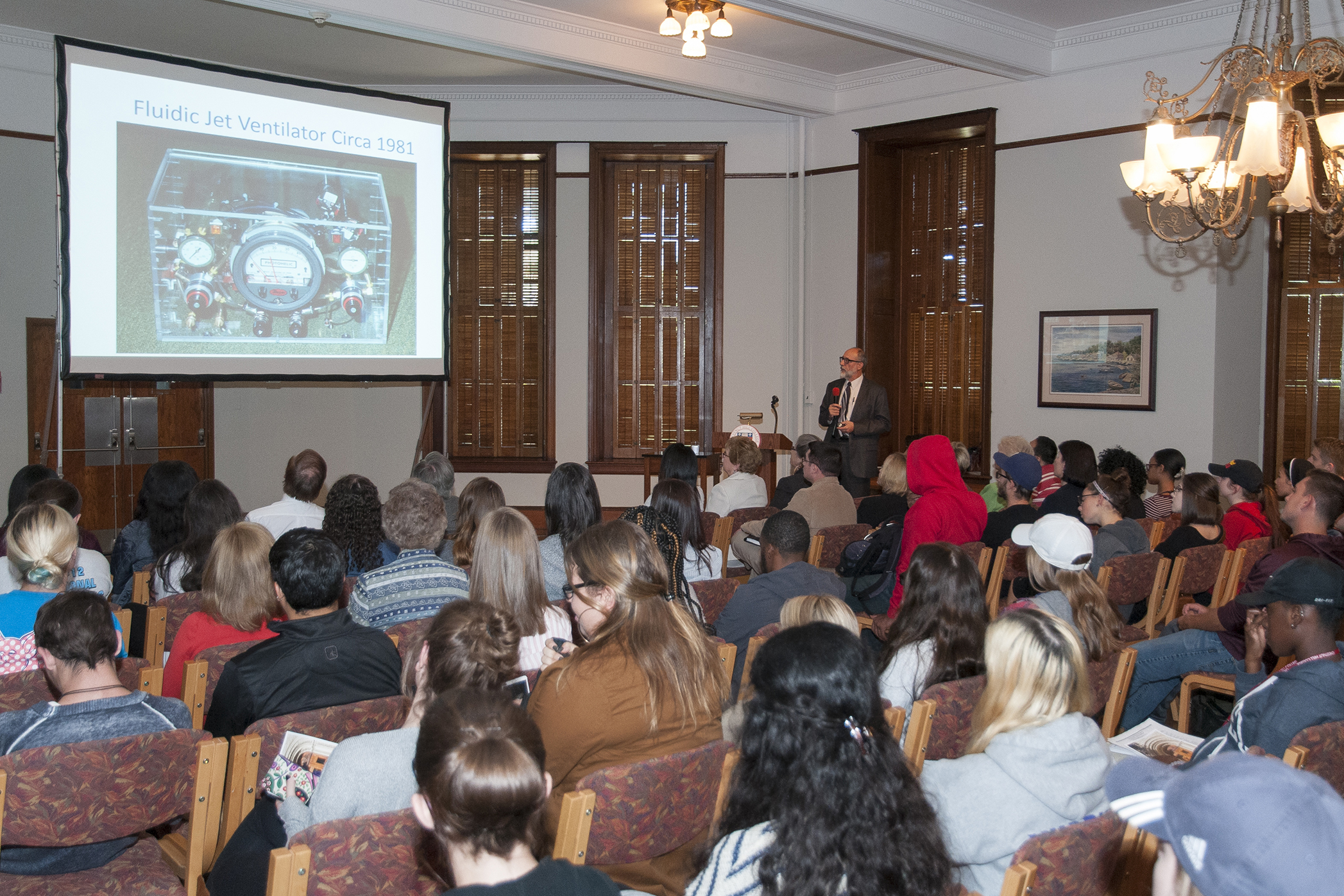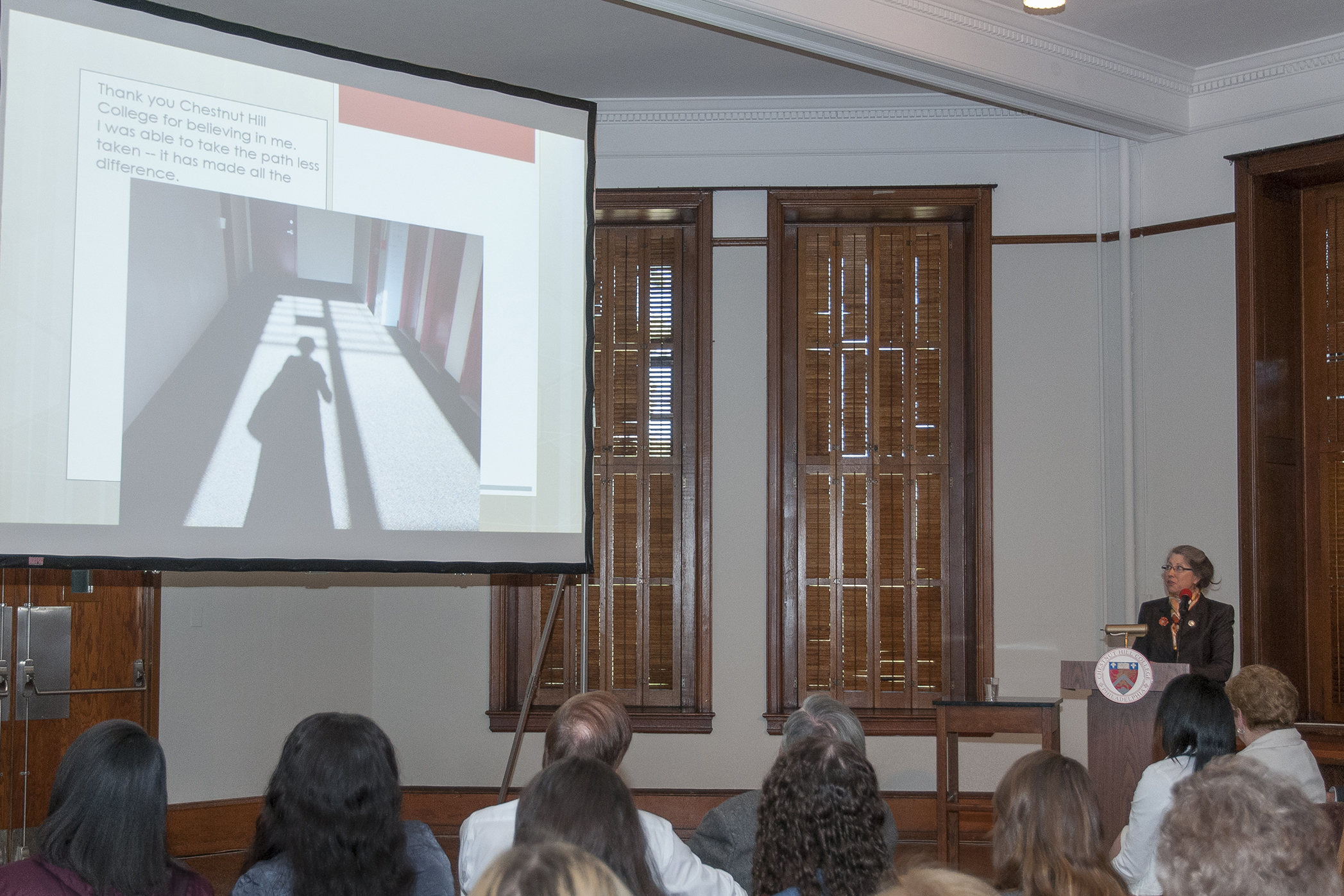The 23rd Annual Fall Biomedical Distinguished Lecture Series featured husband and wife neonatologists.
In front of a room packed with students, faculty, staff and members of the larger community, Lakshmi Atchison, Ph.D., professor of biology and director of the annual Biomedical Distinguished Lecture Series, opened the fall lecture with humor.
“Do you know the phrase, ‘buy one get one?’” Atchison asked, smiling as she welcomed Mary Lenore Gricoski Keszler, M.D., ’74, and her husband, Martin Keszler, M.D., to speak about neonatology. This was the first time the speakers were a married couple. They discussed the field’s advances, many of which they have led, and they spoke of its history.

“It’s very interesting being a neonatal couple,” Mary Keszler said at the opening of her presentation, “A Short History of the Neonatal Follow-Up Programs.”
“It takes a lot of cooperation and patience and has its stresses, but also has a great deal of rewards.”
Advances in Premature Infant Care
Martin Keszler earned his undergraduate and medical degrees from McGill University in Montreal, and is a professor of pediatrics at the Warren Alpert School of Medicine at Brown University. He also holds the position of Associate Director of the Neonatal Intensive Care Unit (NICU) and Director of Respiratory Care Services at Women and Infants Hospital of Rhode Island. Dr. Keszler spoke first in a presentation titled, “Fifty Years of Newborn Intensive Care: You’ve Come a Long Way, Baby!”
Patrick Bouvier Kennedy, the second son of President John F. Kennedy and his wife, Jacqueline, was born prematurely 53 years ago and lived only 39 hours. According to historians, Kennedy’s death from what was then called hyaline membrane disease sparked important advances in the neonatology field.
The condition had been responsible for the deaths of 25,000 infants per year, but the discoveries made after Kennedy’s death “did for the survival of preemies what Sputnik did for the space race,” according to a story from ABC News.
According to Keszler, babies born prematurely and suffering from respiratory distress syndrome, the disease that killed Kennedy, now survive at close to a 100 percent rate thanks to the advances and investment in neonatal care. With this rate so high, the current research and efforts moved beyond survival and into quality of life.
“We can keep the babies alive, great, but what about other factors that affect preterm infants?” Keszler asked before delving into new objectives such as limiting lung injuries and ensuring that brain development is not negatively impacted by life-saving measures.
One of these advances is the Extracorporeal Membrane Oxygenation (ECMO) Program, which Keszler successfully implemented during his time at Georgetown University. The ECMO is a method of long-term lung and/or heart support which is used to treat respiratory failure. While not exclusive to infants and pre-term babies, its biggest successes have come when treating the youngest patients.
“ECMO is a non-invasive respiratory support that leads to better likelihood of survival as well as less chance of brain injury,” said Keszler.
As the title of his presentation stated, neonatology care has “come a long way,” but as Keszler added, “There is still a long way to go.”
The Evolution of the NICU
With so many babies now surviving these first crucial months as they continue their development outside of the womb, the need for fully equipped and staffed NICUs has become even more prevalent.
“One of the most important things in development for a preterm infant is skin-to-skin contact with the mother and studies have found that often in the open-ward settings of NICUs, that is less likely to occur,” said Mary Keszler, clinical assistant professor of pediatrics at the Warren Alpert School of Medicine at Brown University and member of both the neonatal transport team and neonatal follow-up team at Women and Infants Hospital.
Leading the way nationwide in its movement to transform NICUs into private spaces, Keszler, who earned her M.D. from Pennsylvania State University’s Milton S. Hershey School of Medicine, has seen the growth at her own hospital as Women and Infants recently completed a new $76-million building, which is designed to house 80 neonatal beds in single-family private rooms.
According to Keszler, this privacy is just as important for the babies as it is for the families.

“Each patient has a family and so is multi-faceted,” she said. “Studies have found an increased rate of depression in families with preterm babies because of the constant fear and worry. Our NICUs are designed to alleviate that as best as possible. We want people to know they are not places to be feared but rather rooms of love and hope where everyone has potential.”
In addition to her work with NICUs, Keszler also is involved in a neonatal follow-up program which allows her to check on the developmental progress of the babies following their release from the NICU at one month, three months, seven months, 12 months and then every year up to age five. At the four-year checkup, there is even a party for each baby.
“This passion I have to do this work, to care holistically about newborns and to see them through their proper development, is something I only have because of my time at CHC,” said Keszler. “It was here that I found a mentor and a friend in Sister Eva Marie Lynch and in this very room (East Parlor) where I found out I had gotten into medical school thanks to my classmates presenting me with a Hershey bar, to symbolize my acceptance into Penn State’s Hershey School of Medicine. I’ve only been able to take the path less traveled because of everything I learned here and for myself and these babies. It has made all the difference.”
— Marilee Gallagher ’14
In 2017-18, the Biomedical Distinguished Lecture Series will be celebrating its 25th anniversary. Planned speakers are: Paul A Offit, M.D., Maurice R. Hilleman Chair of Vaccinology, Perelman School of Medicine, University of Pennsylvania (April 5, 2017), Dianne R. Soprano, Ph.D., professor and associate dean of the graduate and MD/Ph.D. program, Lewis Katz School of Medicine, Temple University (October 4, 2017), Alexander R. Vaccaro, M.D., Ph.D., M.B.A., president of Rothman Institute, chairman of the department of orthopedics, Sidney Kimmel Medical College (Spring 2018), Thomas Jefferson University, and Michael G. Ciccotti, M.D., The Everett J. and Marian Gordon Professor of Orthopedic Surgery, director and chief of sports medicine, Rothman Institute, president of the MLB team physicians association and head team physician for the Philadelphia Phillies and St. Joseph's University.
For more information on these speakers, please contact Lakshmi Atchison, Ph.D., professor of biology and director of the annual Biomedical Distinguished Lecture Series, at latchiso@chc.edu.





